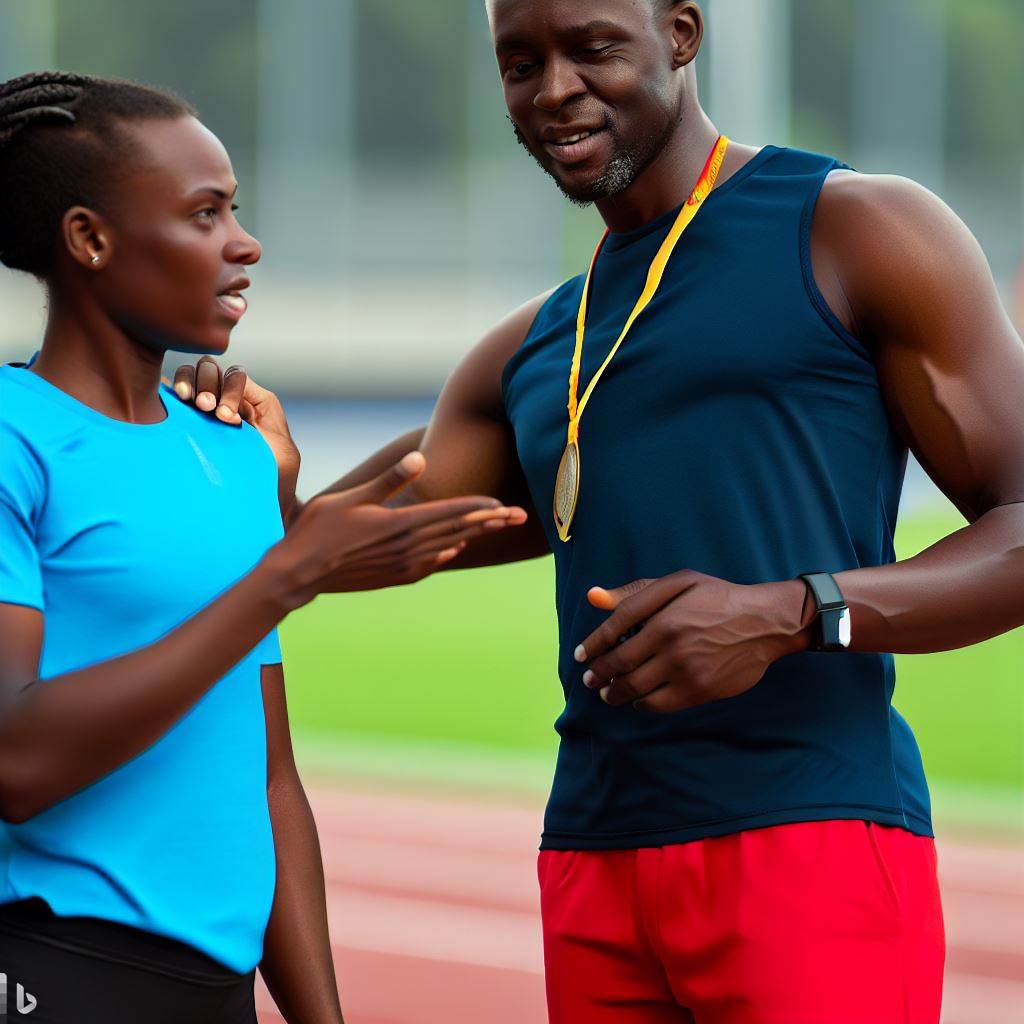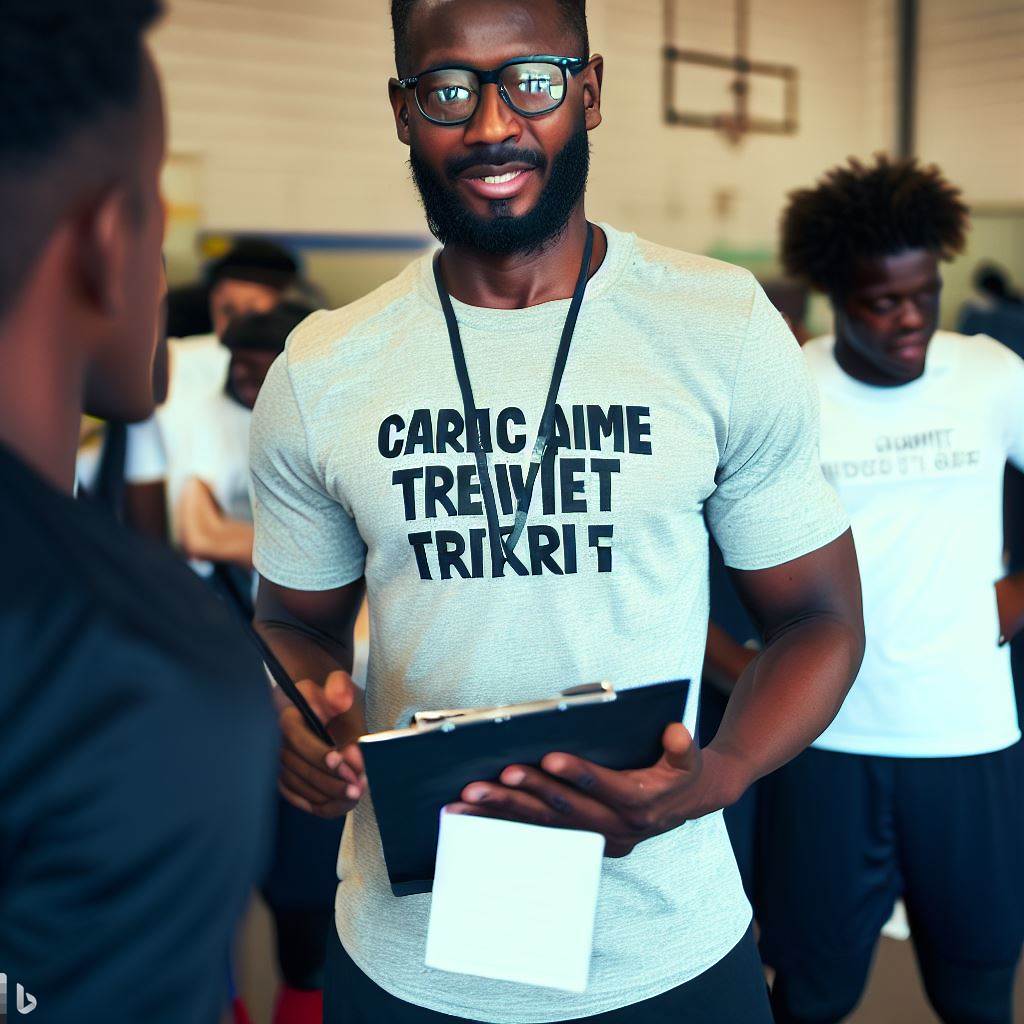Introduction
Ethics and professionalism in athletic training are fundamental principles in ensuring the well-being and success of athletes.
These concepts encompass the moral and ethical responsibilities of athletic trainers to uphold the highest standards of conduct, competence, and integrity.
In Nigeria, discussing this topic is crucial due to the unique challenges and opportunities within the country’s sporting landscape.
Athletic trainers in Nigeria face various ethical dilemmas, such as ensuring athletes’ health and safety while striving for optimal performance.
With limited resources and healthcare infrastructure, ethical decision-making becomes even more critical.
Moreover, the lack of standardized regulations and guidelines within Nigeria’s athletic training profession amplifies the need for ethical discussions.
The importance of ethics and professionalism in Nigeria extends beyond individual athletes to the reputation of Nigerian sports as a whole.
Upholding ethical standards enhances the credibility and integrity of the athletic training profession, fostering trust among athletes, coaches, and stakeholders.
Additionally, Nigeria’s burgeoning sports industry presents opportunities for athletic trainers to contribute to the growth and development of sports talent.
However, this potential can only be fully realized through ethical practices and professional behavior.
By adhering to ethical standards, athletic trainers can set an example for aspiring athletes and positively impact the overall sports ecosystem in Nigeria.
In essence, ethics and professionalism play a crucial role in athletic training, and it is essential to discuss their relevance specifically in the context of Nigeria.
By emphasising ethical decision-making and professional conduct, athletic trainers can navigate the unique challenges and opportunities within Nigeria’s sporting landscape and contribute to the growth and success of Nigerian sports.
Definition of Athletic Training
Athletic training encompasses the prevention, diagnosis, and treatment of injuries in athletes.
Key responsibilities and duties of athletic trainers include:
- Injury Prevention: Athletic trainers design and implement injury prevention programs to minimize the risk of injuries among athletes.
- Injury Evaluation: They assess and evaluate injuries to determine the extent and nature of the damage.
- Rehabilitation: Athletic trainers develop and implement rehabilitation programs to aid athletes in the recovery process.
- Emergency Care: They provide immediate care and treatment in case of a sports-related emergency or injury.
- Treatment and Management: Athletic trainers administer appropriate treatments, such as therapeutic exercises and modalities, to promote healing in injured athletes.
- Education and Counseling: They educate athletes on injury prevention techniques, proper nutrition, and help in making appropriate health-related decisions.
- Documentation: Athletic trainers maintain accurate medical records of athletes, including injury history, treatment plans, and progress reports.
- Collaboration: They collaborate with coaches, physicians, and other healthcare professionals to ensure the overall well-being of the athletes.
- Research and Continuing Education: Athletic trainers stay updated with the latest research, technological advancements, and best practices in their field through continuing education.
Ethical Considerations in Athletic Training
Ethics play a crucial role in ensuring professionalism and proper conduct in athletic training.
Some key ethical considerations include:
- Confidentiality: Athletic trainers must maintain the privacy and confidentiality of athletes’ medical information.
- Professionalism: They must adhere to professional codes of conduct, including honesty, integrity, and competence.
- Conflict of Interest: Athletic trainers should avoid situations that may compromise their professional judgment or create conflicts of interest.
- Informed Consent: They need to obtain informed consent from athletes or their guardians before providing any treatment or initiating any procedures.
- Cultural Sensitivity: Athletic trainers should respect athletes’ cultural backgrounds and beliefs when providing care and treatment.
- Professional Boundaries: They must establish and maintain appropriate boundaries with athletes to avoid any misinterpretation or unethical relationships.
- Scope of Practice: Athletic trainers should work within their scope of practice and refer athletes to appropriate healthcare professionals when necessary.
- Continuing Education: They should continually enhance their knowledge and skills through continuing education to provide the best care to athletes.
- Non-Discrimination: Athletic trainers should treat all athletes equally, without any form of discrimination based on race, gender, or any other characteristic.
By following ethical guidelines and upholding the highest standards of professionalism, athletic trainers contribute to the overall well-being and success of athletes.
Read: Top Nigerian Universities for Aspiring Athletic Directors
Ethics in Athletic Training
Athletic trainers have a responsibility to adhere to ethical standards and principles in their practice.
- Providing quality care: Athletic trainers should prioritize the well-being and safety of their athletes.
- Confidentiality: Maintaining the privacy of athletes’ personal and medical information is crucial.
- Informed consent: Athletes should be fully informed about the risks and benefits of any procedures or treatments.
- Integrity: Athletic trainers should act honestly and transparently, avoiding conflicts of interest.
- Professional development: Engaging in continuous learning and keeping skills updated is essential.
Ethical challenges and issues that can arise in the field of athletic training
- Dual relationships: Athletic trainers may face conflicts when they have personal relationships with athletes.
- Financial issues: Receiving gifts or financial rewards may compromise an athletic trainer’s professional judgment.
- Time management: Balancing the needs of multiple athletes and teams can be challenging.
- Cultural differences: Respecting diverse backgrounds, beliefs, and practices may require careful navigation.
- Legal obligations: Knowing and complying with legal requirements and regulations is essential.
Dilemmas athletic trainers may encounter
- Limited resources: Athletic trainers might face difficult decisions when there is a lack of necessary equipment or medical facilities.
- Traditional practices: Nigerian cultural beliefs and traditional remedies may conflict with evidence-based athletic training protocols.
- Gender considerations: Working with athletes of the opposite gender might raise cultural and ethical concerns.
- Unethical competition: Athletic trainers may face pressure to compromise ethical standards in favor of winning at all costs.
- Corruption: Dealing with corruption in the sporting industry can challenge an athletic trainer’s ethics.
Ethical decision-making when facing dilemmas in athletic training in Nigeria
- Consultation: Seeking advice from peers, supervisors, or professional organizations can help navigate ethical challenges.
- Ethical codes: Following established codes of conduct helps maintain professional standards.
- Reflection and self-awareness: Regularly reflecting on personal values and beliefs can guide ethical decision-making.
- Continuing education: Staying informed about ethical issues and best practices in athletic training is essential.
- Seek professional help when needed: When facing complex ethical dilemmas, consulting experts or ethicists can provide guidance.
In summary, ethics and professionalism are integral to athletic training in Nigeria.
Adhering to ethical standards, recognizing and addressing specific challenges, and making informed decisions are vital for the well-being of athletes and the credibility of the profession.
Read: Roles of an Assistant Coach in Nigerian Sports Teams

Professionalism in Athletic Training
Definition of Professionalism in the Context of Athletic Training
Professionalism in athletic training refers to the adherence to ethical standards and the demonstration of appropriate behaviors in the care and treatment of athletes.
Key Attributes and Behaviors that Demonstrate Professionalism
- Integrity: Upholding high moral and ethical principles in all aspects of athletic training.
- Competence: Possessing the necessary knowledge, skills, and abilities to deliver optimal care.
- Accountability: Taking responsibility for one’s actions and decisions in the best interest of the athlete.
- Respect: Treating athletes, colleagues, and other healthcare professionals with dignity and courtesy.
- Empathy: Showing understanding and compassion towards athletes’ physical and emotional well-being.
Impact of Professionalism on the Quality of Care Provided to Athletes
Professionalism plays a vital role in ensuring the provision of high-quality care to athletes:
- Trust and Confidence: Demonstrating professionalism earns the trust and confidence of athletes, allowing them to openly communicate their concerns and seek appropriate care.
- Safety: Professionalism ensures the implementation of comprehensive safety measures and protocols, minimizing the risk of injuries or further harm to athletes.
- Collaboration: Professional behavior fosters effective collaboration with other healthcare professionals, leading to a more holistic approach to athlete care.
- Continual Growth and Learning: Professionalism encourages ongoing education and professional development, ensuring that athletic trainers stay up-to-date with the latest advancements in the field.
- Ethical Decision-Making: Professionalism guides ethical decision-making, ensuring that athletes’ best interests are always prioritized.
- Respect for Boundaries: Professionalism establishes clear boundaries between athletic trainers and athletes, maintaining a professional relationship that upholds the athlete’s well-being.
- Enhanced Communication: Professionalism improves communication between athletic trainers, athletes, and other healthcare professionals, leading to better coordination and more effective care.
- Positive Influence: Demonstrating professionalism sets a positive example for athletes and encourages them to adopt professional behaviors and attitudes.
- Reputation: Professionalism contributes to the overall reputation of athletic trainers, the credibility of the profession, and the trust placed in their expertise and abilities.
- Long-term Relationships: Professionalism fosters strong relationships with athletes, creating an environment of trust and collaboration that can span their athletic careers.
Overall, professionalism in athletic training is essential for providing athletes with the highest quality of care, maintaining their safety, and upholding the integrity of the profession.
Read: A Career Guide: Becoming an Athletic Director in Nigeria
Challenges to Ethics and Professionalism in Nigeria
Identifying and discussing factors in Nigeria that may present challenges to practicing ethical and professional athletic training:
- Lack of adequate facilities and resources for proper training and rehabilitation.
- Inadequate funding for athletic training programs and professional development.
- Inadequate awareness and recognition of the importance of ethics and professionalism in sports.
- Lack of standardized professional guidelines and regulations for athletic trainers.
- Influence of corruption and unethical practices in Nigerian society.
- Social and cultural norms that prioritize winning at all costs rather than fair play.
- Limited access to education and training opportunities for aspiring athletic trainers.
- Ignorance and lack of understanding of the roles and responsibilities of athletic trainers.
- Pressure from coaches, team managers, and athletes to compromise ethical standards for performance enhancement.
- Limited support and recognition from governmental bodies and sports associations.
Cultural, social, or economic factors that may influence ethical decision-making
- Cultural norms that prioritize loyalty to the team or group over individual ethics.
- Social pressure to conform to unethical practices in order to achieve success.
- Economic challenges that may lead to compromising ethical standards for financial gain.
- Power dynamics within sports organizations that may push individuals to make unethical decisions.
- Influence of the media and public opinion on ethical decision-making.
- Limited access to education and training opportunities for aspiring athletic trainers due to economic constraints.
- Social inequality and lack of equal opportunities in sports that may lead to unethical practices.
- Poor governance and lack of accountability in sports organizations.
- Inadequate enforcement of ethical standards by regulatory bodies.
- Underfunding of sports programs and lack of investment in sports infrastructure.
Generally, Nigeria faces several challenges in maintaining ethics and professionalism in athletic training.
These challenges stem from factors such as inadequate resources, limited funding, cultural norms, social pressure, economic constraints, and overall lack of awareness and recognition.
Addressing these challenges requires a collaborative effort from various stakeholders, including government bodies, sports associations, educational institutions, and the athletic training community.
Read: Assistant Athletic Trainers: Impact on Nigerian Sports
Promoting Ethics and Professionalism in Nigeria
When it comes to promoting ethics and professionalism in athletic training in Nigeria, there are several strategies and initiatives that can be implemented. Here are some suggestions:
- Develop and enforce a code of ethics: Establish a clear set of guidelines and ethical standards that all athletic trainers in Nigeria must adhere to. This will help create a culture of professionalism and accountability.
- Provide continuous education and training: It is essential to invest in the ongoing education and training of athletic trainers. This will ensure that they stay up to date with the latest advancements in the field and maintain their professional competence.
- Establish certification programs: Introduce rigorous certification programs that assess the knowledge and skills of athletic trainers. This will help distinguish trained professionals from those without proper qualifications.
- Promote research and evidence-based practices: Encourage athletic trainers in Nigeria to engage in research and utilize evidence-based practices.
- Ensure proper supervision and mentorship: Implement measures to ensure that athletic trainers receive proper supervision and mentorship throughout their careers. This will help them develop professionally and provide better care to athletes.
- Collaborate with professional organizations: Foster partnerships with professional organizations such as the National Athletic Trainers’ Association (NATA) and the Athletic Trainers’ Society of Nigeria (ATSN).
- Establish a regulatory body: Create a regulatory body specifically for athletic trainers in Nigeria. This body can monitor and enforce ethical standards, handle complaints, and ensure accountability within the profession.
- Advocate for legal recognition: Work towards gaining legal recognition for athletic trainers in Nigeria. This will further legitimize the profession and provide a framework for ethical conduct and professional standards.
By implementing these strategies, Nigeria can ensure that athletes receive the highest level of care and the athletic training profession gains the recognition it deserves.
Conclusion
Ethics and professionalism play a significant role in athletic training in Nigeria. It is crucial for athletic trainers to adhere to these principles to ensure the safety and well-being of athletes.
Continuous improvement is necessary to stay updated with the latest techniques and advancements in the field.
By continuously improving their skills and knowledge, athletic trainers can provide the best possible care to athletes.
It is important to inspire readers to strive for ethical and professional practice in athletic training.
By doing so, they can contribute to the betterment of athletics in the country and promote a positive reputation for Nigeria in the global sports community.
Ethics and professionalism are not just words but pillars that support the foundations of athletic training in Nigeria.
The dedication and commitment of trainers to these principles will foster trust and confidence in athletes and the entire sports industry.
In an era where sports constantly face ethical challenges, it is essential to prioritize integrity and professionalism in athletic training.
By upholding these values, Nigeria can achieve excellence in sports and inspire future generations to do the same.
Let us embrace ethics and professionalism in athletic training to pave the way for a bright and prosperous future for athletics in Nigeria.
Together, we can make a difference and elevate the standards of athletic training in the country.




